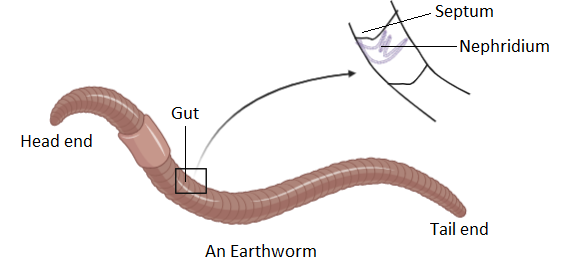
Excretion is carried out by nephridia in
A. Cockroach
B. Amoeba
C. Earthworm
D. Human
Answer
571.8k+ views
Hint: Excretion is an important process carried out by all living organisms to throw out the waste produced in the body. It happens differently in different organisms. The nephridia are excretory organs present in invertebrate organisms. They act as the vertebrate kidney. They are tubule shaped organs that are usually ciliated.
Complete answer:
Excretion is carried out by nephridia in an earthworm. Excretion is a process of removal of metabolic waste from the body outside of the body. Every organism requires energy for which they eat food. Ingested food gets digested to obtain energy. The food used to get energy is employed in various metabolic processes. These metabolic processes produce waste as side products. If this waste is not removed, it causes a threat to the body as it can be lethal. Thus, excretion is an important process for the survival of organisms. The excretory system is unique in every organism but has one function that is the removal of waste. Nephridia are excretory organs present in invertebrates like earthworms, arthropods, and molluscs. The general structure of nephridium is like a tubular structure. It is usually present in pairs just like in vertebrates kidneys are present in pairs. Each segment of the earthworm body consists of two nephridial pores.

i. Amoeba is a unicellular eukaryotic organism that has an irregular shape. It consists of contractile vacuoles that act as excretory organs in it.
ii. The cockroach is considered a primitive insect. It consists of malpighian tubules that act as excretory organs in it.
iii. In humans, the excretory system consists of kidneys. Two bean-shaped organs are present in the lower abdominal region.
Therefore, the right answer is option C.
Note: The nephridium is classified into two types. metanephridium is an excretory gland that is present in invertebrates. It consists of a ciliated funnel type opening in the body cavity connected to a duct that opens the exterior to the organism’s body. The other, protonephridia is a network of tubules that lack internal openings. The ends of tubules are called flames cells. These are found in Rotifera, Chordata, etc.
Complete answer:
Excretion is carried out by nephridia in an earthworm. Excretion is a process of removal of metabolic waste from the body outside of the body. Every organism requires energy for which they eat food. Ingested food gets digested to obtain energy. The food used to get energy is employed in various metabolic processes. These metabolic processes produce waste as side products. If this waste is not removed, it causes a threat to the body as it can be lethal. Thus, excretion is an important process for the survival of organisms. The excretory system is unique in every organism but has one function that is the removal of waste. Nephridia are excretory organs present in invertebrates like earthworms, arthropods, and molluscs. The general structure of nephridium is like a tubular structure. It is usually present in pairs just like in vertebrates kidneys are present in pairs. Each segment of the earthworm body consists of two nephridial pores.

i. Amoeba is a unicellular eukaryotic organism that has an irregular shape. It consists of contractile vacuoles that act as excretory organs in it.
ii. The cockroach is considered a primitive insect. It consists of malpighian tubules that act as excretory organs in it.
iii. In humans, the excretory system consists of kidneys. Two bean-shaped organs are present in the lower abdominal region.
Therefore, the right answer is option C.
Note: The nephridium is classified into two types. metanephridium is an excretory gland that is present in invertebrates. It consists of a ciliated funnel type opening in the body cavity connected to a duct that opens the exterior to the organism’s body. The other, protonephridia is a network of tubules that lack internal openings. The ends of tubules are called flames cells. These are found in Rotifera, Chordata, etc.
Recently Updated Pages
Master Class 11 Computer Science: Engaging Questions & Answers for Success

Master Class 11 Business Studies: Engaging Questions & Answers for Success

Master Class 11 Economics: Engaging Questions & Answers for Success

Master Class 11 English: Engaging Questions & Answers for Success

Master Class 11 Maths: Engaging Questions & Answers for Success

Master Class 11 Biology: Engaging Questions & Answers for Success

Trending doubts
One Metric ton is equal to kg A 10000 B 1000 C 100 class 11 physics CBSE

There are 720 permutations of the digits 1 2 3 4 5 class 11 maths CBSE

Discuss the various forms of bacteria class 11 biology CBSE

Draw a diagram of a plant cell and label at least eight class 11 biology CBSE

State the laws of reflection of light

10 examples of friction in our daily life




